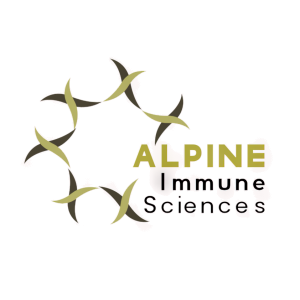Alpine Immune Sciences to Present Povetacicept (ALPN-303) Phase 1 (RUBY-1) Study Data at the 2023 American Academy of Dermatology Annual Meeting
Date/Time:
Poster Title: Phase 1 Study in Healthy Adults of the Safety, Tolerability, Pharmacokinetics, and Pharmacodynamics of Povetacicept (ALPN-303), a Dual BAFF/APRIL Antagonist for the Treatment of Autoimmune Blistering Diseases (RUBY-1)
Poster Number: 42273
Location:
Presenter:
About Povetacicept (ALPN-303) and the RUBY-1 Phase 1 Study
Povetacicept (ALPN-303) is a dual antagonist of the BAFF (B cell activating factor) and APRIL (a proliferation inducing ligand) cytokines, which play key roles in the activation and survival of B cells, particularly antibody-secreting cells. Based upon an engineered TACI (transmembrane activator and CAML interactor) domain, povetacicept exhibits greater potency in preclinical studies versus wild-type TACI-based comparators, as well as other inhibitors of BAFF and/or APRIL alone. Povetacicept is in development for multiple B cell and/or autoantibody-related diseases.
RUBY-1 (NCT05034484) is a phase 1, randomized, placebo-controlled study in healthy adult volunteers designed to evaluate the safety, tolerability, pharmacokinetics, and pharmacodynamics of single doses of intravenously and subcutaneously administered povetacicept. Povetacicept was well tolerated at doses up to 960 mg, with dose-dependent pharmacokinetics and reductions in circulating immunoglobulins and antibody-secreting cells, supporting the use of a once every four-week dose regimen for subsequent studies.
About
Forward-Looking Statements
This release contains forward-looking statements within the meaning of Section 27A of the Securities Act of 1933, Section 21E of the Securities Exchange Act of 1934 and the Private Securities Litigation Reform Act of 1995. These forward-looking statements are not based on historical fact and include statements regarding our platform technology and potential therapies; the potential efficacy, safety profile, future development plans, addressable market, regulatory success, and commercial potential of our product candidates; and the timing of our public presentations and potential publication of future clinical data. Forward-looking statements generally include statements that are predictive in nature and depend upon or refer to future events or conditions and include words such as “may,” “will,” “should,” “would,” “expect,” “plan,” “intend,” and other similar expressions, among others. These forward-looking statements are based on current assumptions that involve risks, uncertainties, and other factors that may cause actual results, events, or developments to be materially different from those expressed or implied by such forward-looking statements. These risks and uncertainties, many of which are beyond our control, include, but are not limited to: clinical trials may not demonstrate safety and efficacy of any of our product candidates; our ongoing discovery and preclinical efforts may not yield additional product candidates; our discovery-stage and preclinical programs may not advance into the clinic or result in approved products; any of our product candidates may fail in development, may not receive required regulatory approvals, or may be delayed to a point where they are not commercially viable; we may not achieve additional milestones in our proprietary or partnered programs; the impact of competition; adverse conditions in the general domestic and global economic markets; the impact of the COVID-19 pandemic on our business, research and clinical development plans and timelines and results of operations, including the impact on our clinical trial sites, collaborators, and contractors who act for or on our behalf, may be more severe and prolonged than currently anticipated; as well as the other risks identified in our filings with the
View source version on businesswire.com: https://www.businesswire.com/news/home/20230316005751/en/
Investors & Media Contact:
ir@alpineimmunesciences.com
Source:








